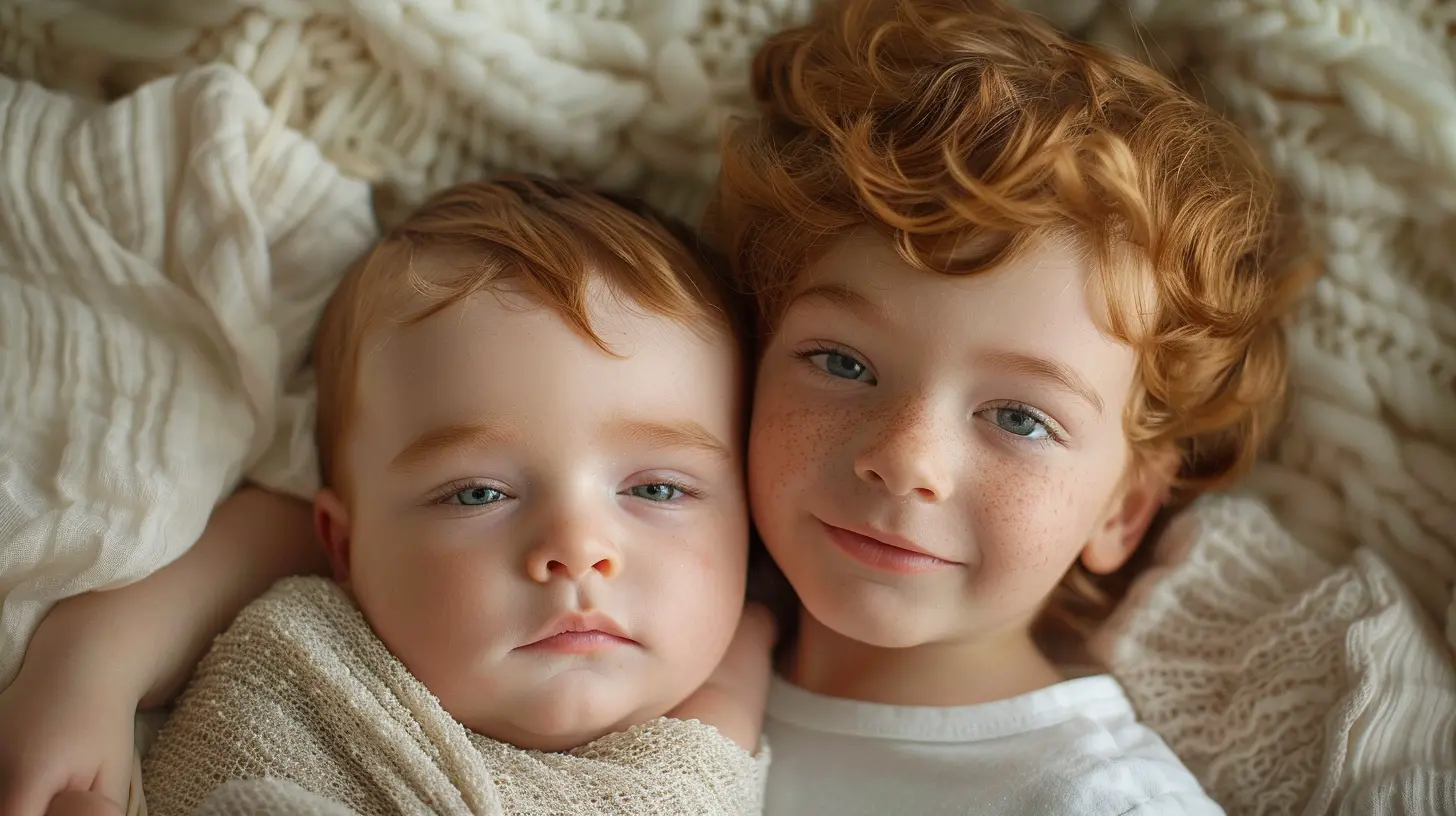Raising Siblings: Nurturing Positive Relationships Between Your Kids
7 June 2025
If you’re a parent of more than one child, you already know that sibling relationships can swing wildly between pure joy and total chaos—sometimes in the same afternoon. One minute they’re giggling over a shared joke, and the next they’re locked in a heated battle over who "breathed too loudly." Sound familiar?
Raising siblings isn’t just about refereeing arguments or dishing out equal portions of mac and cheese. It’s about helping your kids build a relationship that lasts a lifetime—one filled with respect, empathy, and yes, love. So, how do we get there? Let’s dive into the messy, rewarding, and often hilarious work of nurturing positive sibling relationships.
Why Sibling Relationships Matter
Siblings are often our first friends (and sometimes our first rivals). They’re the people we share our childhoods with, the inside jokes that no one else gets, and the family traditions that become lifelong memories.A strong sibling bond can boost emotional intelligence, teach conflict resolution, and give kids a built-in support system that lasts decades beyond the teen years. Pretty powerful stuff, right?
But here’s the catch: This bond doesn’t just magically appear. It needs to be built, brick by brick, day by day—with your help.
Start With Connection, Not Comparison
Let’s clear this up right away: no two kids are the same. One may be the peacekeeper, while the other lives for drama. One might be a bookworm, and the other a born performer. That’s not only okay—it’s beautiful.But problems start when we draw direct comparisons.
> "Why can’t you be more like your sister?"
> "Your brother never complains about chores."
Sound familiar? These kinds of comments, even when unintentional, can plant the seeds of resentment. Instead, focus on connecting with each child as they are. See their strengths individually. When you appreciate them without comparing, they’ll do the same with each other.
Encourage Teamwork Over Competition
Sibling rivalry often comes from feeling like you have to "win" your parents' attention. To reduce that sense of competition, look for ways your kids can work together instead of against each other.Try:
- Team chores: Let them clean up together with a shared goal (and maybe a fun playlist).
- Joint projects: Building a blanket fort? Planning a family picnic? Let them collaborate!
- Shared privileges: A later bedtime or extra screen time when they cooperate.
Framing things this way sends the message that they’re on the same team—not battling for top spot.
Model the Behavior You Want to See
Let’s be real: Kids are like little copy machines with legs. They’re watching how we interact with our partner, friends, and even strangers. If you handle disagreements with calm and respect, they’re more likely to copy that.But if your go-to move in conflict is yelling or slamming doors, well... guess what they’re going to do when their sibling borrows their favorite hoodie without asking?
So when you’re stressed (because let’s face it, parenting is hard), take a deep breath. Show them what it looks like to listen, to compromise, and to apologize. Yep—even adults get it wrong sometimes.
Give Them Space to Be Individuals
It’s easy to lump siblings together—after all, you're juggling a million things. But your kids need to know they’re valued not just as part of a sibling set, but as unique individuals.So:
- Spend one-on-one time with each child regularly.
- Celebrate their unique interests (even if one loves bugs and the other loves ballet).
- Avoid grouping them with labels like “the shy one” or “the troublemaker.”
Respecting their differences helps prevent jealousy and boosts their self-esteem—which in turn makes them more generous with their sibling.
Teach Them to Resolve Conflicts—Not Avoid Them
Let’s get one thing straight: conflict isn’t bad. It’s normal. Healthy even. The goal isn’t to eliminate arguments (because, good luck with that), but to teach kids how to handle them constructively.Here’s what helps:
- Name the emotion: “Sounds like you’re feeling frustrated. Is that right?”
- Guide, don't solve: Resist the urge to jump in and fix everything. Ask questions instead. “What do you think would be fair?”
- Encourage empathy: “How would you feel if your sister said that to you?”
Over time, they’ll learn how to work through disagreements without turning the living room into a WWE ring.
Celebrate Their Wins—Big and Small
Did they share their tablet without being asked? Cheer for it. Did they comfort a crying sibling? That’s huge. The more you point out and praise positive behavior, the more they’ll repeat it.Instead of just focusing on what’s going wrong ("Stop fighting!"), make a big deal about what’s going right:
- “I loved how you helped your brother tie his shoes. That was really kind.”
- “You both did awesome building that Lego castle together!”
Kids are more likely to grow closer when they feel seen and appreciated for their efforts—especially by you.
Set Boundaries and Consequences—Fairly
Rules help kids feel safe. That said, fairness doesn’t always mean everything has to be equal. One child may need more support, time, or structure than another. The key is being clear and consistent with expectations.A few tips:
- Establish family rules about respect and kindness.
- Avoid taking sides in every little squabble.
- Teach them that privileges come with responsibility—regardless of age or birth order.
When the rules feel balanced (instead of biased), kids are less likely to resent each other.
Encourage Shared Experiences
Want to strengthen the sibling bond? Build memories. Shared laughter and adventures create stories they’ll retell for years—and that emotional foundation pays off when sibling tension shows up later.Try:
- Family traditions: Game nights, weekend pancakes, summer trips.
- Silly rituals: Made-up songs, nicknames, or inside jokes.
- Creative play: Fort building, scavenger hunts, or putting on a backyard play.
These moments seem small now, but they’re the glue that holds relationships together when life gets messy.
Don’t Panic Over the Fights
Here’s a reality check: Even the closest siblings fight. A lot. That’s part of learning how to share space, time, and parents. So don’t panic when tempers flare. It doesn’t mean you’re failing.The trick is helping them repair the relationship after conflict. Encourage apology, forgiveness, and moving forward. You’re giving them a toolkit they’ll use for the rest of their lives—in friendships, partnerships, and (gasp!) parenting one day.
Frequently Asked Questions About Sibling Dynamics
Q: What if my kids just don’t seem to get along, no matter what I do?A: Some siblings click right away; others need more time and guidance. Keep modeling kindness, encouraging empathy, and giving them opportunities to bond. Relationships evolve. Don’t lose hope.
Q: Is sibling rivalry normal?
A: Totally. It’s often a sign they’re trying to figure out their place in the family. Your job isn't to eliminate it, but to help them move through it in healthy ways.
Q: Should I always make them apologize?
A: Apologies are important, but they should be genuine. Model what a heartfelt apology looks like, and talk about why it matters instead of forcing it on the spot.
Final Thoughts: You’re Planting Seeds
If nurturing sibling relationships feels like a never-ending job, that’s because—you guessed it—it kind of is. But you're not just raising kids who tolerate each other. You're planting the seeds for lifelong friendship, mutual respect, and unconditional love.It won’t always be smooth sailing. There’ll be slammed doors, shouted "It's mine!" battles, and lots of eye-rolling. But there will also be shared laughs, comforting hugs, and forged bonds too strong to break.
And one day, you just might overhear them having each other’s backs—and you’ll realize all the "he took my toy!" battles were worth it.
all images in this post were generated using AI tools
Category:
Positive ParentingAuthor:

Liam Huffman
Discussion
rate this article
3 comments
Esther Turner
This article beautifully highlights the importance of fostering strong sibling bonds. Practical tips, like encouraging teamwork and open communication, can significantly enhance relationships. Investing time in these connections now will yield lifelong benefits for your children.
June 13, 2025 at 2:39 AM

Liam Huffman
Thank you for your kind words! I'm glad you found the tips valuable for nurturing strong sibling relationships. Investing in these bonds truly pays off.
Malia McVicar
Excited to explore sibling dynamics together!
June 8, 2025 at 3:36 AM

Liam Huffman
Thank you! Excited for your journey in fostering those meaningful connections!
Samuel Kane
Fostering positive sibling relationships requires intentionality. Encouraging open communication, shared experiences, and conflict resolution can create a supportive environment, helping siblings develop lifelong bonds and emotional resilience.
June 7, 2025 at 3:04 PM

Liam Huffman
Absolutely! Intentionality in fostering communication and shared experiences is key to building strong sibling bonds and emotional resilience. Thanks for highlighting this important aspect!



